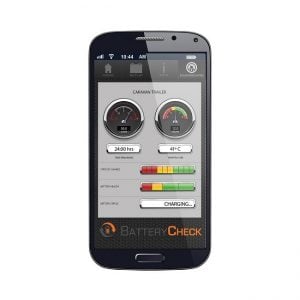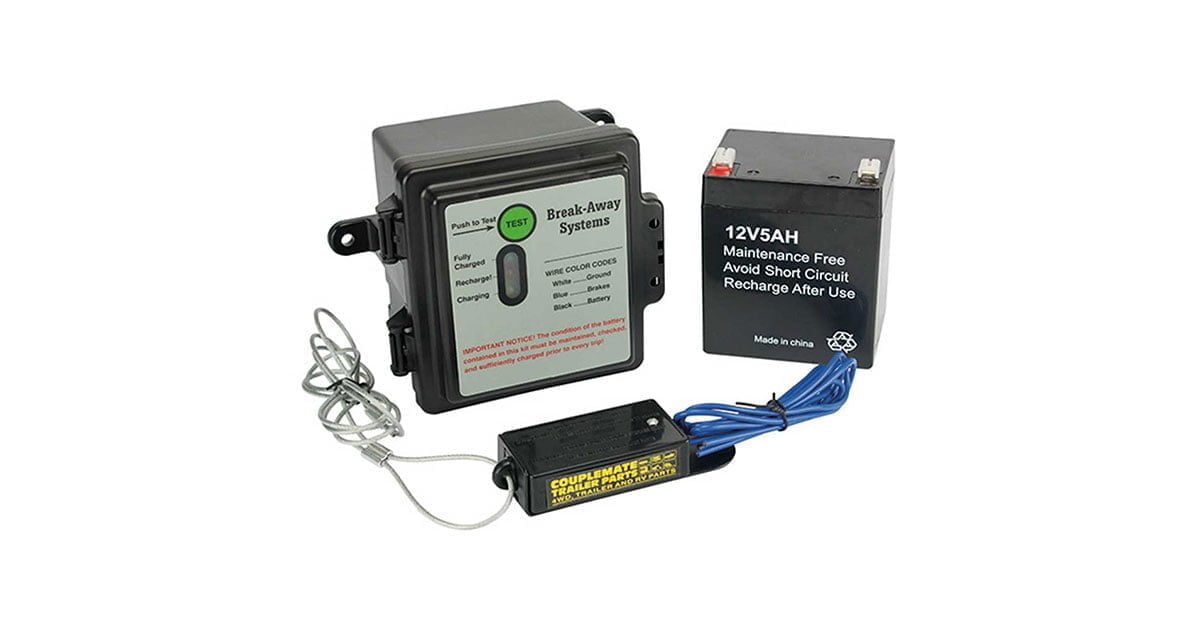The legal requirements for caravan trailer breakaway kits are the same for all states and territories.
NSW requirements for remote battery condition monitoring have changed, and a monitor is no longer required.
Important check: Have you checked the length of the lanyard is not so long that it failed to pull the pin with fully stretched chains?
News: Lanyard Breakaway Switch Safety Alert
If you are unsure about the correct trailer parts you must have, call our expert sales term on 0733483822.
 Caravan On-Board Battery
Caravan On-Board Battery
It is permissible to use the caravan battery as a breakaway battery, provided you can see the battery condition from the bash board.
This Bluetooth battery monitor is brilliant. It provides all the battery conditions and more. Click here to purchase.
Introduction
All trailers with a total weight of over 750kg require brakes.
For trailers and Caravans with a GTM of up to 2,000kg, the braking system can be either an overrun system or one with electric brakes operated from the driver’s seat.
Remote control of electric brakes via APP is also allowed.
Overrun brakes are not acceptable on trailers over 2,000kg.
Further, the braking system must be such that if the trailer accidentally breaks away (from the towing vehicle), the trailer brakes will apply automatically and remain on for at least 15 minutes.
The brakes must operate on ALL WHEELS (exceptions are trailers that are not over 2 tonnes Aggregate Trailer Mass (ATM) and trailers manufactured before ADR38-04/–. Their service brakes must operate on all wheels on at least one axle).
Installation of the Caravan Trailer Breakaway System
Trailer and caravans equipped with electric brakes, it is necessary to have the following equipment:
- A breakaway switch is fitted to a caravan or trailer, and its attachment point is compatible with the towing vehicle.
- A battery, either on the trailer or within the caravan, is of sufficient capacity to maintain full braking for at least 15 minutes.
- The towing vehicle has an electrical circuit that automatically keeps the trailer battery fully charged. It is also capable of warning the driver if the battery is flat.
- One grounded wire to each brake unit) and not via the trailer suspension components, wheel bearings or tow couplings.
- Furthermore, a visible label must be attached to the caravan.
- Finally, the breakaway lanyard must be adjusted to disable the pin when the chains are at full stretch while connected to the tow vehicle.
Note:
If the towing vehicle is subject to Australian Design Rule 31/– “Hydraulic Brake Systems for Passenger Cars” or Australian Design Rule 35/– “Commercial Vehicle Brake Systems,” it is critical to ensure that the fitment of any control unit will not alter the towing vehicle’s electric brake system.
Issued by Vehicle Standards, Driver and Vehicle Policy Branch, Roads Traffic Authority of New South Wales (2 pages)
Cat. No. 45070602
Registration
Before a trailer can be registered, a van equipped with electric brakes must, when presented for inspection and connected to a towing vehicle equipped as specified on page 1.
Definitions
- Aggregate Trailer Mass (ATM. The total mass of the full trailer when carrying the maximum load recommended by the manufacturer. ATM includes any weight imposed on the drawing vehicle when the combination vehicle rests on a horizontal supporting plane.
- Gross Trailer Mass (GTM). Weight is transmitted to the ground by the axle or axles of the trailer when coupled to a drawing vehicle. In addition to carrying its maximum load of approximately uniformly distributed over the load-bearing area. ATM = A + B + C GTM = A + B

0 Comments